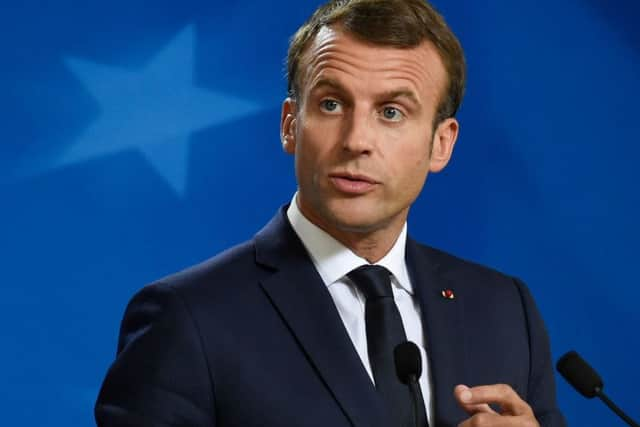Brexit: Emmanuel Macron in EU customs union threat to Scottish fishing
The French President said that unless a new fishing agreement is agreed by the end of 2020, maintaining reciprocal access to waters and imposing the same quotas as today, he would seek to trigger the ‘backstop’ included in the UK’s divorce deal, keeping it under EU customs rules.
Mr Macron’s comments are set to make fishing the first major flashpoint of trade talks between the UK and the EU before negotiations have even begun.
Advertisement
Hide AdAdvertisement
Hide AdTheresa May already faces a difficult battle to convince Scottish and other Conservative MPs who represent coastal constituencies that her deal with Brussels will not tie the fishing industry to the same EU rules under a different agreement.


At a press conference in Brussels, the Prime Minister claimed that her deal would “not just deliver a bigger annual quota within the Common Fisheries Policy, it sets us free of the CFP for good and forever.”
Mrs May added: “The UK will be an independent coastal state once again, in full sovereign control of our waters, able to decide for ourselves who we allow to fish in them, with that access not tied to any other aspect of our economic partnership.”
But EU leaders made clear they would fight for the same terms as under the Common Fisheries Policy, according to minutes of the discussion among the other 27 member states.
The notes set out that Brussels will push for a new agreement “as a matter of priority”, and believe it “should be built on... existing reciprocal access and quota shares”.
The minutes add: “Such an agreement should be negotiated well before the end of the transition period.”
Brussels will decide whether to impose the backstop, designed to ensure no hard border appears in Ireland, at the end of the transition period in December 2020 - although under the terms of the Brexit deal, the UK could refer any such action to a joint arbitration panel.
Speaking to journalists, following the summit, Mr Macron said: “An agreement assumes that each side promotes its position.
Advertisement
Hide AdAdvertisement
Hide Ad“We as 27 have a clear position on fair competition, on fish, on the subject of the EU’s regulatory autonomy, and that forms part of our lines for the future relationship talks, which is a lever, because it is in our mutual interest to have this future relationship.
“I can’t imagine that the desire of Theresa May or her supporters is to remain for the long term in a customs union, but to define a proper future relationship which resolves this problem.”
Earlier, on arrival in Brussels, Mr Macron thanked the EU’s chief negotiator Michel Barnier for ensuring “reciprocal access” to fishing waters was part of the UK’s exit package, and pledged that France’s fishermen “will be well protected” in trade talks.
Two thirds of the fish caught in British waters are fished by European boats, while 75% of the UK’s catch is sold in the EU.
Other EU leaders also highlighted the importance of fishing yesterday, including the Dutch Prime Minister Mark Rutte.
Mr Rutte argued that trading access to waters for the ability to continue exporting fish to the European market was a good deal for the UK.
“The general issue of fishing will be an important subject over the next 18 months,” he said. “We hope by the summer of 2020 to conclude on fisheries the exact nest stage.
“France, the Netherlands, Spain and Denmark, we have a big interest here but also so does the UK to maintain market access to the EU for products coming out of UK waters.
“There’s a common necessity to come to a conclusion.”
Advertisement
Hide AdAdvertisement
Hide AdRoss Thomson, the Aberdeen South Conservative MP who has said he intends to vote against the Brexit deal, said the EU statement “does deeply trouble me”.
“The current arrangement is very good for the EU, the arrangement we have on fisheries has been devastating for fishing communities across Scotland and the UK.
“It’s in the interests of the EU to keep it going and they want to build on those existing arrangements so to my mind that can only mean the continuation of some form of the CFP.
“It may not be called that but if it looks like the CFP and behaves like the CFP then it is the CFP and that’s why we need to resist it as we go into these negotiations.”
Opposition parties said the comments put further pressure on Scottish Secretary David Mundell, who along with the rest of the Scottish Tory MPs, had made leaving the CFP and no trading access to waters for market access a Brexit red line.
Nicola Sturgeon tweeted: “I’ll be interested to hear David Mundell explain how this – ‘existing reciprocal access and quota shares’ – can be squared with the promises made to the Scottish fishing industry. (Hint – it can’t).”
And the Shadow Scottish Secretary Lesley Laird wrote to Mr Mundell, telling him the EU’s stance represented “a clear breach of your red line on fishing”.
“I would therefore be grateful if you were able to clarify that you will not be voting for the deal on this basis,” she said in her letter.
“If that is the case, I really must ask why you have not resigned your position in the Cabinet?”
